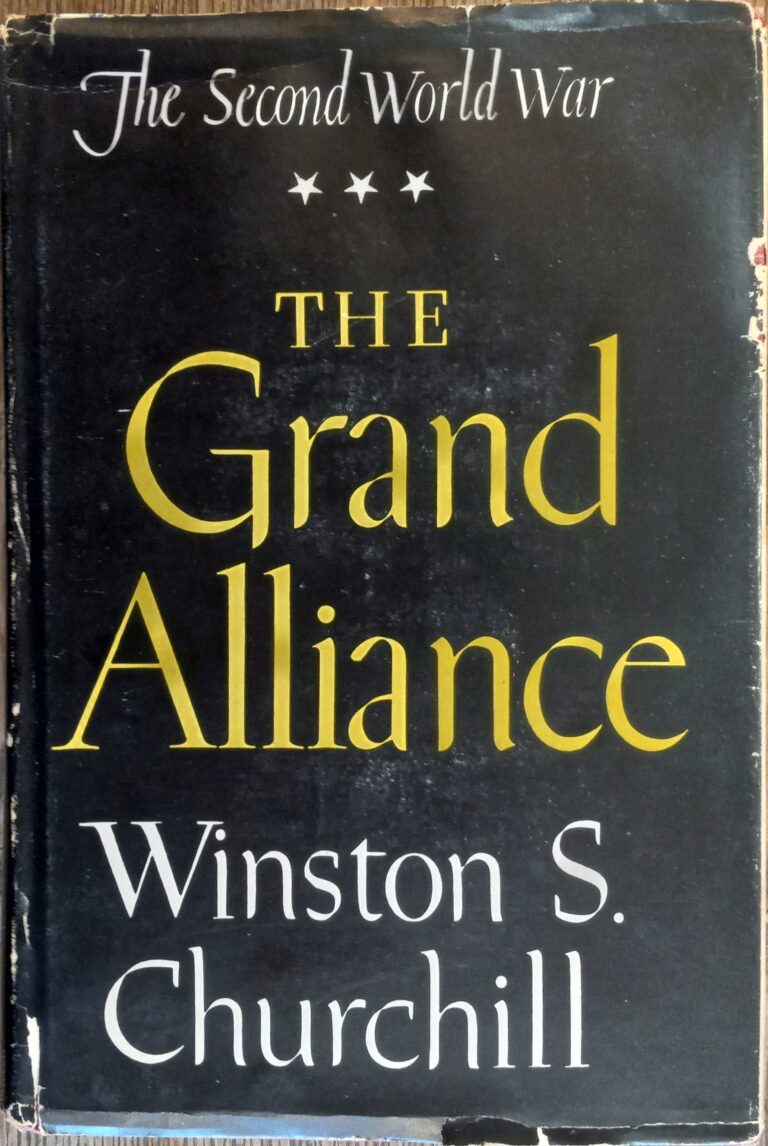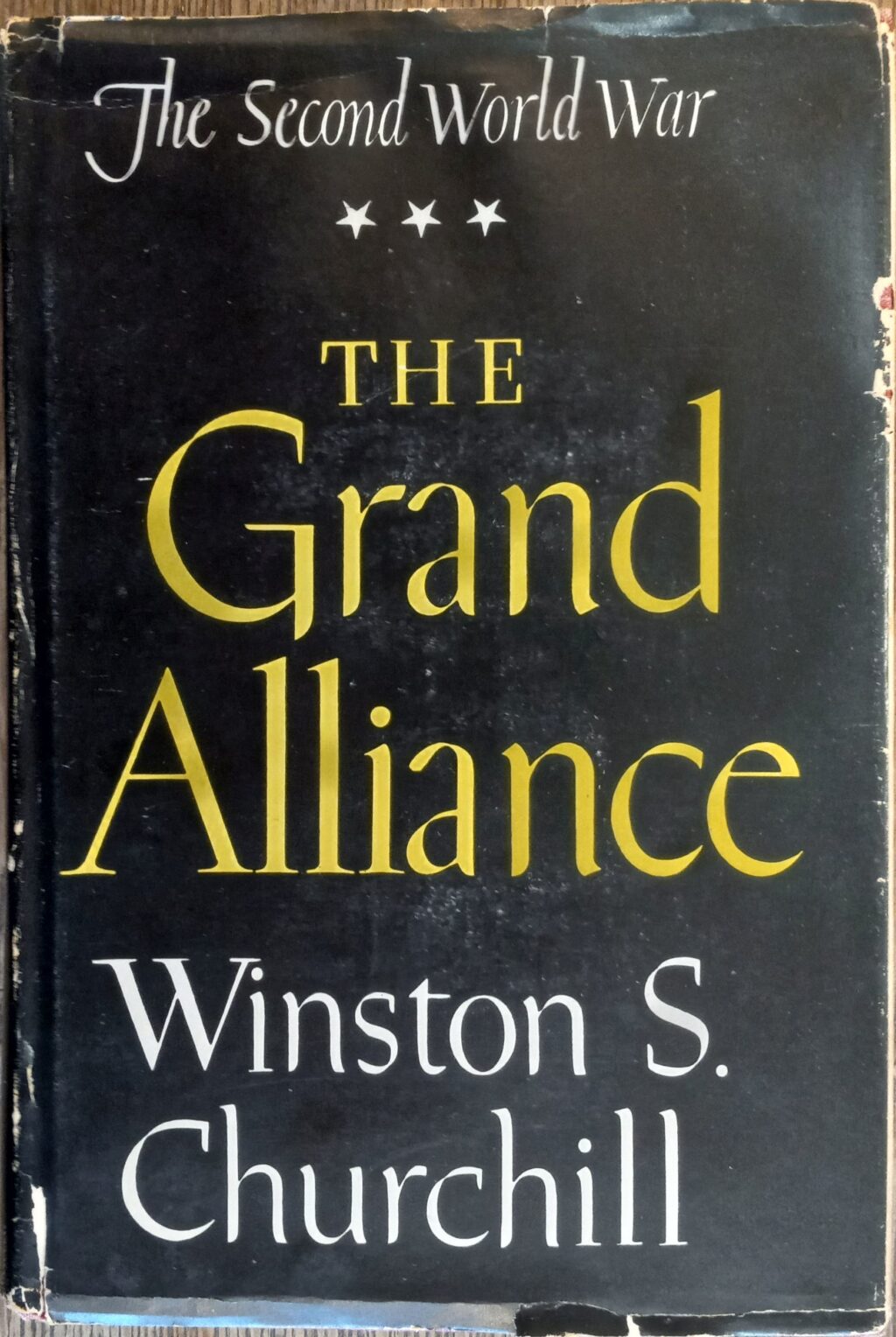Winston S. Churchill, The Second World War: Volume III, The Grand Alliance (1950)
Robert Menzies jeopardised his position as prime minister to be in Britain and press Australia’s needs on Winston Churchill’s War Cabinet, but did Churchill really want him there? After all, those who were present at the tense meetings testify that Menzies was one of the few people willing to directly disagree with the notoriously stubborn (but often brilliant) wartime leader. While any public account provided by a political figure is liable to contain a highly sanitised version of events (particularly considering Churchill sent Menzies a copy of his book), The Grand Alliance offers some useful insights into what went on.
The third volume of Churchill’s landmark six-volume history of the Second World War, its treatment of the discussions through which Australian troops were controversially committed to assisting Greece in its attempt to resist the combined forces of Fascist Italy and Nazi Germany, is notably brief. Churchill reports that Menzies was present for the pivotal meeting of 24 February 1941, and that the cabinet ultimately reached a ‘unanimous’ decision, but few further details are provided. Slightly more revealing is the coverage of the subsequent meeting of 7 March, where Churchill notes that a ‘special burden rested’ on Menzies in committing the AIF, and that he faced the task ‘full of courage’.
However, Churchill is willing to be more candid about the political pressures which forced Menzies to return home in May, and his subsequent attempts to do whatever was necessary to come back and have Australia’s voice heard at the centre of the action:
‘[Menzies’s] prolonged visit to England had been most valuable. He had sat through two critical months with the War Cabinet, and had shared many of our most difficult decisions. He had not been satisfied either with the organisation of the Cabinet or with my exercise of such wide powers in the conduct of the war. He raised both points with me on several occasions, and I gave my reasons for not agreeing with him.’
Even as Menzies was leaving, he wrote to his fellow Dominion prime ministers, proposing a new Imperial War Cabinet in which they would all have full representation. Churchill notes that Canada’s Mackenzie King essentially rebuffed his Australian counterpart, arguing that it would be constitutionally improper to have Canada’s government bound by the decisions of the prospective cabinet – which would inevitably be meeting so far away.
When, back in Australia, Menzies found his Coalition colleagues unwilling to bear the risks of his once again travelling overseas, he inquired whether another government minister would be permitted to have the same access to the War Cabinet as the Australian PM himself, but Churchill said politely but firmly that the answer was no:
‘I need not say that should you be able to pay us another visit as Prime Minister your presence at our councils for as long as you are able to stay would be most welcome. We shall welcome all Dominion Prime Ministers who will in this way share our responsibilities. It would not be possible for a Dominion Minister other than the Prime Minister to sit in the War Cabinet as representation of all four Dominions would then be involved resulting in too large a permanent addition to our members; this in turn would entail far-reaching structural changes which are not in contemplation. My inquiries suggest that there would be no chance of the other Dominions agreeing to a Minister from a single Dominion representing them in the War Cabinet. I hope you will bear these points in mind when making your plans.’
Churchill showed more sympathy in criticising the Australian Labor Party, which had refused to join a national government like the one their UK counterparts had joined, leaving Menzies without the political security he needed to do what he felt was necessary to uphold Australia’s national interest:
‘The Labour Party in Australia opposed a vote approving Mr. Menzies’ visit to London. In view of these political manifestations both within and outside the Government, he placed his resignation in the hands of his colleagues and offered to serve in an Australian National Cabinet. On August 25 the Australian Labour Party rejected this proposal and demanded the resignation of the Government. On the 28th Mr. Menzies resigned, and was succeeded by his deputy, Mr. Fadden. The Australian Government, weakened by the loss of its ablest figure, had a majority of only one, and were confronted in this grievous period by a party Opposition thirsting for local power. In spite of the differences which I have mentioned, it was with great regret that I learned of Mr. Menzies’ fall. Although my disagreements with him were serious, our relations had been most friendly. I thought it was a great pity that all the knowledge he had acquired of our affairs and of the war while sitting for four months in the War Cabinet, and the many contacts we had all of us established with him, should be lost.’
The telegram Churchill sent Menzies on learning of his resignation is heartfelt, especially when one considers that the UK leader was an extremely busy person, who had no reason to assume that Menzies would ever return to such a prominent office:
‘While I scrupulously abstain from all interference in Australian politics, I cannot resist telling you with what sorrow I have learned of your resignation. You have been at the helm during these two terrible years of storm, and you were with us here during its most anxious time for Australia. We are all very grateful to you for the courage you showed and the help you gave. I am the gainer by our personal friendship. I went through a similar experience when I was removed from the Admiralty at a moment when I could have given the Anzacs a fair chance of victory at the Dardanelles. It is always a comfort in such circumstances to feel sure one has done one’s duty and one’s best.’
You might also like...
Sign up to our newsletter
Sign up for our monthly newsletter to hear the latest news and receive information about upcoming events.



